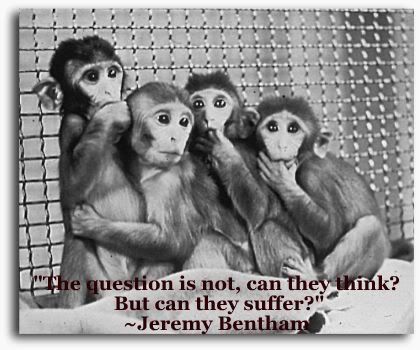Phil
Dominique
One Voice
Animals in Scientific Research
The Ethical Argument

Animal advocates oppose vivisection, or animal experimentation, on ethical grounds, believing that it is morally wrong to harm one species for the supposed benefit of another. Animal advocates encourage others to extend the circle of compassion to include all living creatures-human and nonhuman alike.
Extending the circle of compassion beyond humankind demands a break with traditional thought, which holds that animals exist for humans to use as they see fit. In a world that is largely anthropocentric (human centered), the idea of compassion, respect and justice for all animals is often disregarded as mere sentimentality.
After all, people argue, where would we be if we could not use animals for food, clothing, and transportation-or as research tools? Animals are seen simply as resources-as little more than products to make our lives more convenient and comfortable.
Animal advocates, on the other hand, view animals through a wider ethical prism-and it involves far more than sentimentality. We believe that animals should not be viewed as resources and products, but as fellow living creatures who share our planet…and that they deserve moral consideration that recognizes their rightful place in the vast and complex web of life.
Both human and nonhuman animals have been blessed with gifts unique to our own species, and we each have our own ecological niche that fits together into the natural world. The right to enter into the circle of compassion cannot be measured by mental, physical or emotional abilities. As the great English philosopher Jeremy Bentham wrote, "The question is not, can they think? But can they suffer?"
Being sentient beings, which means the ability to experience sensation or feelings, animals caught in the web of scientific research suffer enormously both physically and psychologically. Even those few "laboratory" animals that escape outright physical pain and discomfort are almost always subjected to isolation, depression and anxiety. In fact the worst atrocity we inflict upon animals condemned to scientific research may be the act of removing them from the natural habitat, or breeding them in captivity, and then placing them in the artificial environment of a laboratory cage, where they have no hope of having the kind of life nature intended for them.
In the end, we as a society have a choice. Do we treat our fellow creatures with cruelty and callousness? Or with compassion, respect and justice? As humans, we have the freedom to make that choice. With this freedom comes the moral obligation to make responsible decisions.
Animals have no such choice. Because they cannot say no, they are completely vulnerable to whatever the researcher has in store for them, no matter how much pain and suffering is involved. Animals are unable to understand or claim their right to be alive, to be free from pain and suffering, and fulfill their biological potential. Therefore, it is up to humans to recognize and protect those rights for them, just as we are morally obligated to protect infants, the developmentally disabled and the mentally ill.
It has been said that the moral progress of our society can be measured by the way it treats animals. Animal experimentation-an institutionalized form of exploitation-stands in the way of moral progress.
Now is the time to extend our sphere of ethical concern
to all creatures!
Posted by: One Voice















0 Comments:
Post a Comment